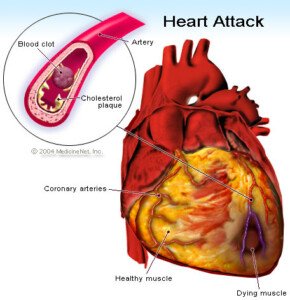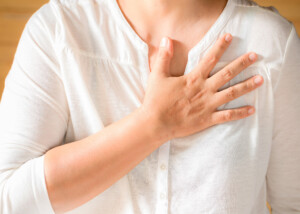
©Lorra Garrick
Vomiting and nausea can be a sign that a heart attack is imminent.
This is not about an actual heart attack in progress, but vomiting and nausea as a warning sign that a heart attack is in the very near future.
“Nausea and vomiting are very complex interactions between the brain and the stomach,” says Michael Fiocco, MD, Chief of Open Heart Surgery at Union Memorial Hospital in Baltimore, Maryland, one of the nation’s top 50 heart hospitals.
“The scientific thinking behind myocardial ischemia or infarction associated with nausea relates to the vagus nerve,” continues Dr. Fiocco.
Myocardial ischemia simply means depletion of oxygen to heart muscle. Infarction means tissue death.

The vagus nerve “arises from the brain and travels through the neck, along the esophagus, and gives off nerve fibers to the heart before continuing into the abdomen where it supplies nerves to the stomach,” explains Dr. Fiocco.
“So there is the stomach-heart-brain connection. Why people get nausea prior to a heart attack may be similar to why people get arm, neck or jaw pain rather than chest pain.
“A lot of overlapping circuits may cause the brain to misread the signals, leading to nausea or left arm pain rather than chest pain.”
Of course, being overcome with nausea, as a result of conditions ripe for a heart attack, can then lead to vomiting.
Vomiting was a tip-off to me that my mother might be having a heart attack, or that a heart attack was looming around the corner for her.
She awakened one morning reporting difficulty breathing.
I brushed it off as a panic attack, since trouble breathing is one of a panic attack’s classic symptoms.
She had a history of panic attacks, along with “labored breathing.”
That particular morning seemed like just another panic episode, especially since I knew that about five or six weeks prior, she had quit taking Effexor altogether. Effexor helps suppress panic and anxiety attacks.
I was staying with my parents because my father, just days prior, had back surgery.
About a half hour later I heard my mother call out to my father, “Quick, bring it over here!”
Intuition told me she was referring to a waste can and that she was about to vomit.
I raced upstairs to their bedroom and saw my mother upchucking into a small waste can.
Much of it was dry-heaving, actually, but yellow gunk definitely was coming out.
The bells went off because my mother had never vomited during a panic attack or after one subsided.
Since when did she vomit? I knew that an imminent heart attack can cause vomiting.
She just had a bout of breathing difficulty bad enough to make her weep.
Something told me to get her to the emergency room for a cardiac evaluation.
Two evenings later she was undergoing quintuple bypass surgery – just in time, said the cardiothoracic surgeon; though my mother had not suffered a heart attack, he said that a massive heart attack could have occurred any moment due to severe coronary artery blockage.
In my mother’s case, the vomiting was a sign that something was wrong with her heart, I believe.
Nothing she ate the day prior could explain the upchucking.
She had not been in any pain, either (pain can cause nausea). So in hindsight, it’s logical to conclude that my mother’s pending heart attack caused the vomiting (and difficulty breathing).
Does this mean that next time you feel nauseous or vomit, you should fear imminent heart attack?
Of course not. But take notice of any other symptoms like shortness of breath, trouble breathing, chest pain or tightness, sweating, and pain in the jaw, arm, neck or back that can’t be explained by other benign factors …
… and take into consideration if you have risk factors for a heart attack like smoking, excess weight, lack of exercise, diabetes and a junk food diet. Puking is no laughing matter.

Dr. Fiocco specializes in treating artery disease, valvular disease and aortic aneurysm. His heart care expertise has earned him recognition by Baltimore Magazine as a Top Doctor in 2010, 2011, 2013, 2016 and 2017.
 Lorra Garrick has been covering medical, fitness and cybersecurity topics for many years, having written thousands of articles for print magazines and websites, including as a ghostwriter. She’s also a former ACE-certified personal trainer.
Lorra Garrick has been covering medical, fitness and cybersecurity topics for many years, having written thousands of articles for print magazines and websites, including as a ghostwriter. She’s also a former ACE-certified personal trainer.
.









































